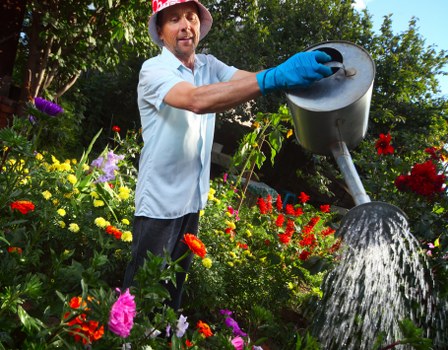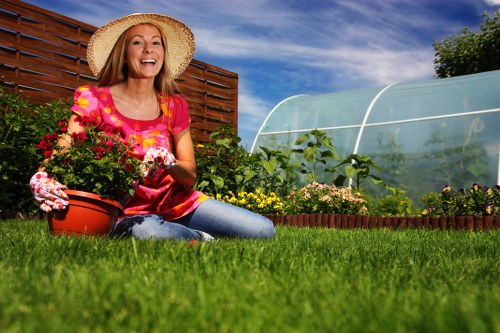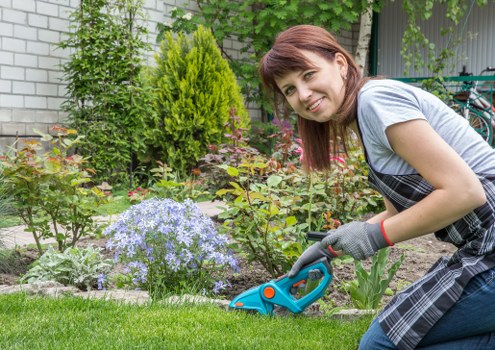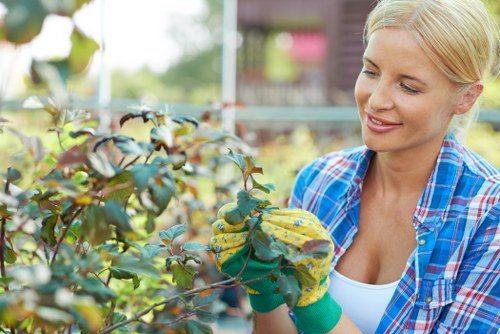Comprehensive Guide to Garden Maintenance in Finchley
Why Garden Maintenance is Essential in Finchley

Maintaining a beautiful garden in Finchley not only enhances the aesthetic appeal of your home but also contributes to a healthier environment. Regular garden maintenance ensures that your plants thrive, pests are kept at bay, and the overall landscape remains inviting.
With Finchley's unique climate, tailored garden care is crucial. Understanding the local weather patterns, soil types, and native plant species can make a significant difference in the success of your garden.
Additionally, a well-maintained garden serves as a perfect retreat for relaxation and recreation. Whether you're an avid gardener or a casual plant enthusiast, consistent maintenance can transform your outdoor space into a personal oasis.
Key Components of Effective Garden Maintenance

1. Regular Weeding
Weeds compete with your plants for essential nutrients, water, and sunlight. Regularly removing weeds helps your desired plants to flourish without unnecessary competition.
2. Pruning and Trimming
Pruning not only maintains the shape and size of your plants but also promotes healthy growth. Trimming dead or overgrown branches can prevent diseases and encourage new blooms.
3. Soil Health Management
Healthy soil is the foundation of a thriving garden. Regularly testing and amending your soil with compost or fertilizers ensures that your plants receive the nutrients they need.
- Use organic compost to enrich the soil.
- Implement mulching to retain moisture and suppress weeds.
- Rotate crops to prevent soil depletion.
Seasonal Garden Maintenance Tips

Spring
As the weather warms up, it's time to prepare your garden for the growing season. Start by clearing out any debris from the winter and planting new seeds or bulbs.
Summer
Summer requires vigilant care to ensure plants receive adequate water. Implementing drip irrigation systems and providing shade during the hottest parts of the day can help your garden thrive.
Autumn
Autumn is perfect for planting perennials and preparing your garden for the colder months. Raking leaves and adding mulch can protect plant roots from frost.
Choosing the Right Plants for Finchley Gardens

Selecting plants that are well-suited to Finchley's climate and soil conditions is vital for a successful garden. Consider native species that are adapted to the local environment, requiring less maintenance and water.
Perennials vs. Annuals
Perennials provide long-term beauty as they return year after year, while annuals offer vibrant seasonal color. A mix of both can create a dynamic and ever-changing garden landscape.
Drought-Tolerant Plants
In areas where water conservation is important, drought-tolerant plants like lavender, sedum, and ornamental grasses can add texture and color without excessive watering needs.
Professional Garden Maintenance Services in Finchley

For those who prefer to leave garden maintenance to the experts, several professional services in Finchley can cater to your needs. These services offer comprehensive care, from landscaping and planting to regular upkeep and seasonal adjustments.
Benefits of Hiring Professionals
- Expert knowledge of local flora and gardening techniques.
- Time-saving solutions for busy homeowners.
- Access to specialized tools and equipment.
By entrusting your garden to professionals, you ensure that your outdoor space remains well-maintained and continues to enhance the beauty of your home year-round.
DIY Garden Maintenance Tips
For garden enthusiasts who enjoy hands-on care, DIY garden maintenance can be both rewarding and cost-effective. Here are some tips to keep your Finchley garden in top shape:
Regular Watering Schedule
Establishing a consistent watering schedule helps prevent over or under-watering. Early morning is the best time to water your plants, reducing evaporation and allowing foliage to dry before evening.
Composting
Creating a compost bin for kitchen scraps and garden waste enriches your soil naturally. Compost adds essential nutrients and improves soil structure, promoting healthier plant growth.
Pest Management
Implementing natural pest control methods, such as introducing beneficial insects or using organic sprays, can keep your garden healthy without harmful chemicals.
- Introduce ladybugs to control aphids.
- Use neem oil as a natural pesticide.
- Plant garlic and marigolds to repel pests.
Enhancing Your Garden with Sustainable Practices
Incorporating sustainable practices into your garden maintenance routine not only benefits the environment but also creates a resilient and thriving garden. Here are some strategies to consider:
Rainwater Harvesting
Installing rain barrels to collect rainwater provides an eco-friendly water source for your garden, reducing reliance on municipal water and conserving natural resources.
Native Plant Selection
Choosing native plants ensures that your garden supports local wildlife and requires less maintenance, as these plants are naturally adapted to the Finchley climate.
Energy-Efficient Lighting
Using solar-powered garden lights reduces energy consumption and adds a magical ambiance to your outdoor space during the evenings.
Common Challenges in Garden Maintenance and Solutions
Gardening comes with its set of challenges, but with the right knowledge and strategies, you can overcome them effectively:
Dealing with Pests
Pests can wreak havoc on your garden. Regular monitoring and implementing integrated pest management techniques can help keep pest populations under control.
Managing Weeds
Weeds compete with your plants for resources. Regular weeding and the use of mulch can suppress weed growth and maintain a neat garden appearance.
Soil Erosion
Preventing soil erosion is essential for maintaining soil health. Planting ground covers and using terracing techniques can stabilize the soil and prevent loss from heavy rains.
Final Thoughts on Garden Maintenance in Finchley
Maintaining a garden in Finchley requires a combination of knowledge, effort, and dedication. Whether you choose to manage your garden yourself or enlist the help of professionals, consistent care ensures a vibrant and healthy outdoor space.
Remember to stay informed about the best practices, adapt to the changing seasons, and enjoy the process of nurturing your garden. A well-maintained garden not only beautifies your home but also provides a sanctuary for relaxation and enjoyment.
Contact us today to learn more about our garden maintenance services or book your service now to transform your garden into a stunning masterpiece.

